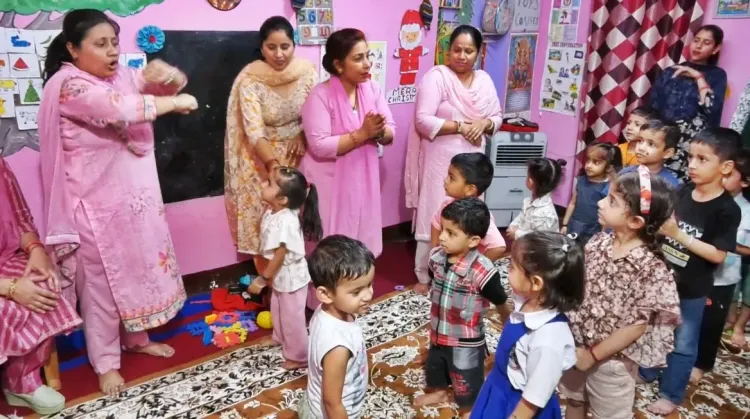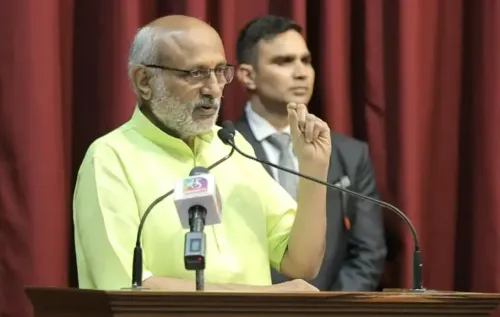How are Anganwadi centres in J&K's Udhampur evolving into smart preschools?

Synopsis
Key Takeaways
- Revamped Anganwadi centres are now equipped with smart classrooms.
- The initiative emphasizes early childhood education and care.
- Focus on nutrition and health services for holistic development.
- ICDS plays a crucial role in implementation and training.
- Children are now better prepared for formal schooling.
Udhampur, May 22 (NationPress) In an impressive move under the New Education Policy (NEP) by the Centre, Anganwadi centres in Jammu & Kashmir's (J&K) Udhampur district are undergoing a transformation into comprehensive preschool centres.
These newly upgraded centres now operate as kindergartens, featuring advanced teaching tools such as smart classrooms, aimed at establishing a solid educational foundation for children aged 3 to 6 years.
The initiative seeks to enhance early childhood care and education, acknowledging the crucial significance of mental development during these early years. The Integrated Child Development Services (ICDS) Department is actively overseeing the implementation, focusing on infrastructure improvements, curriculum integration, and training for staff.
Integrating elementary education at the Anganwadi level ensures children are prepared for school and equipped for formal education. The introduction of smart classroom facilities makes learning more interactive and enjoyable, nurturing curiosity and creativity among the young learners.
Equally significant is the government’s focus on the nutritional aspects of early childhood development. The ICDS Department guarantees the ongoing provision of nutritious meals and health services for children, as well as for pregnant and lactating women.
This comprehensive approach—combining education with nutrition and care—represents a substantial leap toward fostering a brighter future for the children of J&K. It also serves as a model for other regions to adopt and expand similar integrated early childhood development strategies.
In a conversation with IANS, Udhampur's ICDS District Programme Officer, Subhash Chandra Dogra, shared: "This Anganwadi centre is functioning exceptionally well. Children from ages three to six attend this centre, and we also cater to pregnant and lactating mothers. We provide them with additional nutrition while continuing children's education and health services as per our syllabus. Our trained Anganwadi workers have been instructed on effective teaching methods, incorporating play-based activities, and, in line with the new education policy, we are transitioning to smart classes. We aim to utilize audio-visual aids for teaching, aligning with the future school curriculum.
"Moreover, we focus on the holistic development of each child. We monitor the growth of children aged six months to six years who attend the Anganwadi centre by measuring their height and weight monthly. This allows us to track their growth and identify any instances of stunting or underweight issues. If any child exhibits signs of growth delays, we ensure prompt medical intervention through health check-ups and monitor their recovery progress," he elaborated.
"We also facilitate Aadhaar enrolment at Anganwadi Centres, enabling us to create Aadhaar cards for children over six months and again after five years. For this process, a birth certificate is essential. I urge all parents to obtain the birth certificate promptly after their child is born," he concluded.









